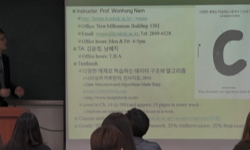In Julius Caesar, against our expectation, Caesar seems to be a titular hero, disappearing in the middle of the action of the play. If the other characters did not mention his name so often, his appearance on stage would be felt much shorter. Moreover...
http://chineseinput.net/에서 pinyin(병음)방식으로 중국어를 변환할 수 있습니다.
변환된 중국어를 복사하여 사용하시면 됩니다.
- 中文 을 입력하시려면 zhongwen을 입력하시고 space를누르시면됩니다.
- 北京 을 입력하시려면 beijing을 입력하시고 space를 누르시면 됩니다.
https://www.riss.kr/link?id=A82414944
- 저자
- 발행기관
- 학술지명
- 권호사항
-
발행연도
2002
-
작성언어
Korean
- 주제어
-
등재정보
KCI등재후보
-
자료형태
학술저널
- 발행기관 URL
-
수록면
217-248(32쪽)
-
KCI 피인용횟수
0
- 제공처
- 소장기관
-
0
상세조회 -
0
다운로드
부가정보
다국어 초록 (Multilingual Abstract)
In fact, everybody in the play can be called another Caesar in that they do just as Caesar did to get what they want. In the Lupercal which first introduces to the audience the birth of Caesarism, Caesar refuses the coronet Antony presents because he perceives that the people don't want him to be king. His refusal, however, does not mean that he gives up becoming king. Rather it means that he strategically chooses to show himself a man determined not to become a king against the wish of his people, a pose that he is a being who puts public good above anything else. Behind this pose lurks his ambition that even if he actually cannot be a king in the Republican Rome, he will remain a symbolic being which is above all kings, a demi-god. Consequently, while Caesar makes all kings think it honoured to be called Caesar though he himself could not actually become a king by his death, he remains subject to his pose. This is not just Caesar's way; it is like a structure permeated in the ways the other characters, including the mob, adopt for different purposes, whether they be ones to support or overthrow Caesar. All the other characters are another Caesar in that sense; they are the agents of Caesarism which once made Caesar say "I am always Caesar."
In Julius Caesar, against our expectation, Caesar seems to be a titular hero, disappearing in the middle of the action of the play. If the other characters did not mention his name so often, his appearance on stage would be felt much shorter. Moreover, his death does not complete the play; rather it is the cause of all that happens after it. But he does not disappear, say, like Duncan who is completely forgotten after his death. The Roman people cry "Let him be Caesar" even when one of his killers, Brutus, explains why he had to get rid of him. For them Brutus is another Caesar. Caesar always already lives in other characters.
In fact, everybody in the play can be called another Caesar in that they do just as Caesar did to get what they want. In the Lupercal which first introduces to the audience the birth of Caesarism, Caesar refuses the coronet Antony presents because he perceives that the people don't want him to be king. His refusal, however, does not mean that he gives up becoming king. Rather it means that he strategically chooses to show himself a man determined not to become a king against the wish of his people, a pose that he is a being who puts public good above anything else. Behind this pose lurks his ambition that even if he actually cannot be a king in the Republican Rome, he will remain a symbolic being which is above all kings, a demi-god. Consequently, while Caesar makes all kings think it honoured to be called Caesar though he himself could not actually become a king by his death, he remains subject to his pose. This is not just Caesar's way; it is like a structure permeated in the ways the other characters, including the mob, adopt for different purposes, whether they be ones to support or overthrow Caesar. All the other characters are another Caesar in that sense; they are the agents of Caesarism which once made Caesar say "I am always Caesar."
동일학술지(권/호) 다른 논문
-
사회 역사적 문맥에서 본 『한여름 밤의 꿈』에 나타난 사랑과 결혼
- 한국셰익스피어학회
- 황효식(Hyosik Hwang)
- 2002
- KCI등재후보
-
- 한국셰익스피어학회
- 권오숙(Kweon O-sook)
- 2002
- KCI등재후보
-
- 한국셰익스피어학회
- 김미애(Mi-Ae Kim)
- 2002
- KCI등재후보
-
- 한국셰익스피어학회
- 김미예(Miye Kim)
- 2002
- KCI등재후보
분석정보
인용정보 인용지수 설명보기
학술지 이력
| 연월일 | 이력구분 | 이력상세 | 등재구분 |
|---|---|---|---|
| 2027 | 평가예정 | 재인증평가 신청대상 (재인증) | |
| 2021-01-01 | 평가 | 등재학술지 유지 (재인증) |  |
| 2018-01-01 | 평가 | 등재학술지 유지 (등재유지) |  |
| 2015-01-01 | 평가 | 등재학술지 유지 (등재유지) |  |
| 2011-01-01 | 평가 | 등재학술지 유지 (등재유지) |  |
| 2009-01-01 | 평가 | 등재학술지 유지 (등재유지) |  |
| 2007-01-01 | 평가 | 등재학술지 유지 (등재유지) |  |
| 2004-01-01 | 평가 | 등재학술지 선정 (등재후보2차) |  |
| 2003-01-01 | 평가 | 등재후보 1차 PASS (등재후보1차) |  |
| 2002-01-01 | 평가 | 등재후보학술지 유지 (등재후보1차) |  |
| 1999-07-01 | 평가 | 등재후보학술지 선정 (신규평가) |  |
학술지 인용정보
| 기준연도 | WOS-KCI 통합IF(2년) | KCIF(2년) | KCIF(3년) |
|---|---|---|---|
| 2016 | 0.12 | 0.12 | 0.14 |
| KCIF(4년) | KCIF(5년) | 중심성지수(3년) | 즉시성지수 |
| 0.12 | 0.11 | 0.561 | 0.03 |





 KCI
KCI DBpia
DBpia







